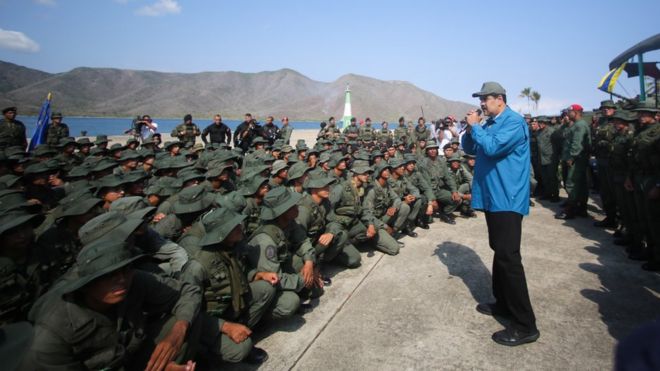 EPA
EPA
Venezuelan President Nicolás Maduro has said he cannot rule out the possibility of civil war as pressure mounts on him to stand down.
In a TV interview, he warned that US President Donald Trump would leave the White House "stained with blood" if he intervened in the crisis.
He also defiantly rejected the EU's Sunday deadline to call snap elections.
Opposition leader Juan Guaidó declared himself interim president and won the backing of the US and others.
Mr Guaidó said on Sunday he would build an international coalition to deliver humanitarian aid to Venezuelans. But Mr Maduro has accused him of organising a coup.
What did Mr Maduro say?
In the interview with Spanish television programme Salvados, broadcast on Sunday, Mr Maduro was asked if the crisis in Venezuela could result in civil war.
"Today no-one could answer that question with certainty," he said.
"Everything depends on the level of madness and aggressiveness of the northern empire (the US) and its Western allies.
- Maduro: Dictator or defender of socialism?
- Why Venezuela's military backs Maduro
- Who is Juan Guaidó?
"We ask that nobody intervenes in our internal affairs... and we prepare ourselves to defend our country."
President Trump has told US broadcaster CBS that the use of military force remains "an option".
But Mr Maduro warned the US leader he risked a repeat of the Vietnam war if he intervened.
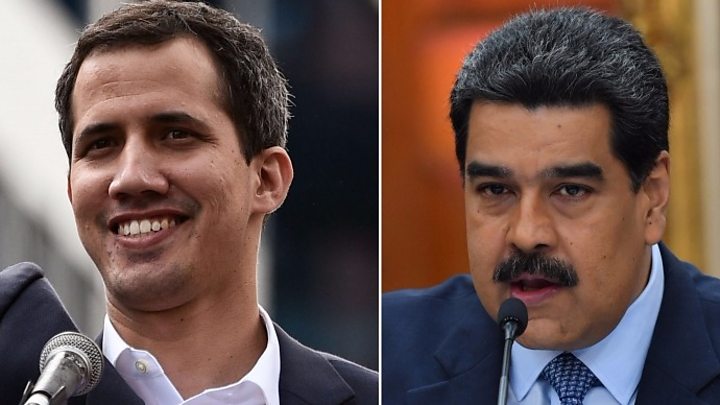
"Stop. Stop. Donald Trump! You are making mistakes that are going to stain your hands with blood and you are going to leave the presidency stained with blood," he said.
"Let's respect each other, or is it that you are going to repeat a Vietnam in Latin America?"
Sunday saw the expiry of a deadline set by several European countries - including France, Britain, Germany and Spain - for Mr Maduro to call early presidential elections. They said that they would recognise Mr Guaidó as interim president if no such pledge was forthcoming.
But Mr Maduro responded: "We don't accept ultimatums from anyone. It's like if I told the European Union: 'I give you seven days to recognise the Republic of Catalonia, and if you don't, we are going to take measures'.
"No, international politics can't be based on ultimatums. That was the era of empires and colonies."
What is the situation in Venezuela?
Thousands took to the streets of the capital Caracas on Saturday for protests in support of both President Maduro and Mr Guaidó.
Mr Maduro retains the support of the military, but ahead of the demonstrations Mr Guaidó received a boost when an air force general - Francisco Yanez - became the highest-ranking military official yet to pledge support for him.
Mr Guaidó says he has held private meetings with the military to win support for ousting Mr Maduro. He says he has also reached out to China, one of Mr Maduro's most important backers.
What is Juan Guaidó's aid plan?
Mr Guaidó does not control any territory in Venezuela, so instead he plans to set up collection centres in neighbouring countries where Venezuelans have fled to.
He said he wanted to set up an international coalition to gather aid at three points, and press Venezuela's army to let it into the country.
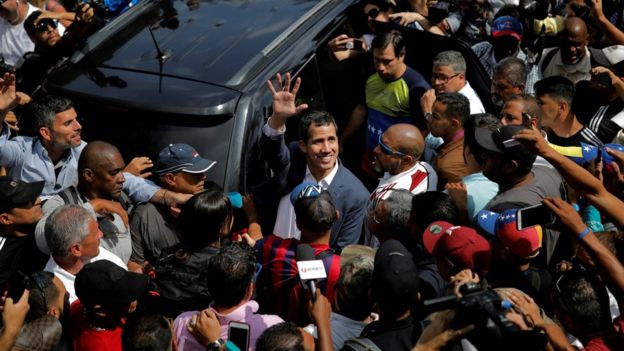 REUTERS
REUTERS
US National Security Adviser John Bolton said on Twitter that plans were being advanced over the weekend.
Mr Maduro has rejected letting aid into the country, telling supporters on Saturday "we've never been nor are we a country of beggars".
What's the background?
Venezuela has suffered economic turmoil for years, with hyperinflation and shortages of essentials such as food and medicine. Millions have fled.
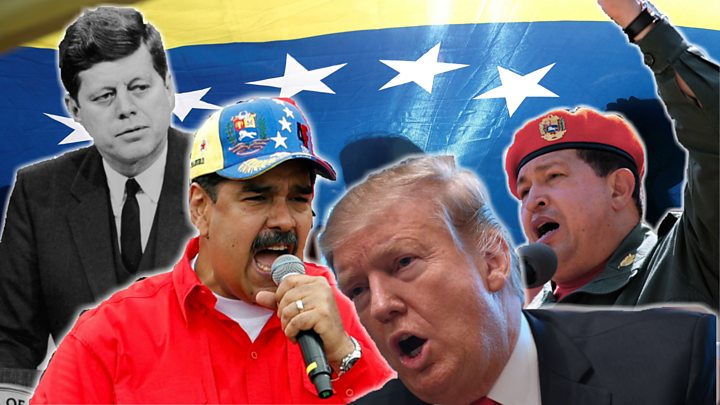
In January, Mr Maduro was sworn in for a second term following disputed elections which many opposition leaders did not contest because they were in jail or boycotting them.
Later that month, Mr Guaidó, who is head of Venezuela's National Assembly, declared himself president.
He says the constitution allows him to assume power temporarily when the president is deemed illegitimate. On Saturday he said protests would continue until his supporters had achieved "freedom".
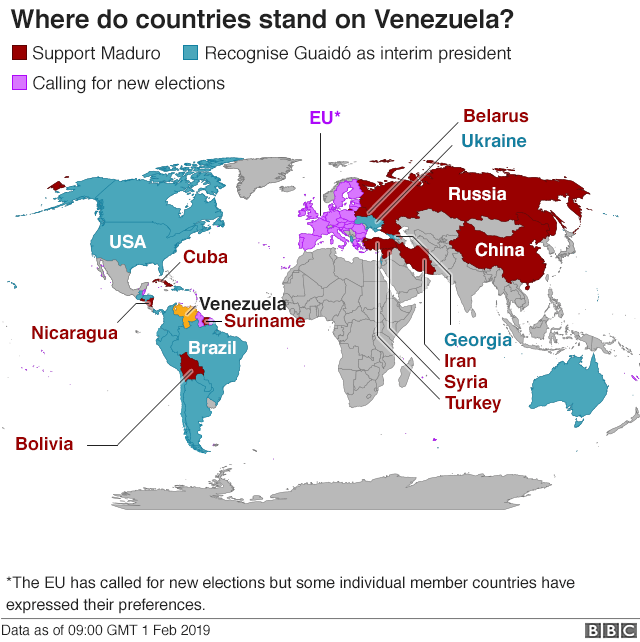

- Why Venezuela's military backs Maduro
- Why Venezuela matters to the US... and vice versa
- Turkey warned over Venezuela gold trade
- Venezuelans 'under Maduro dictatorship' - Juan Guaidó
- Venezuela crisis: US vows to 'disconnect' Maduro's funding
- Who is supporting whom?
- Venezuela: All you need to know about the crisis in nine charts
- Why Russia has so much to lose
Latin America & Caribbean
Sala plane wreckage found in Channel
- 4 February 2019
- Wales
Brazil dam collapse: The crucial questions
- 4 February 2019
- Latin America & Caribbean
Colombia kills dissident Farc rebel leader
- 3 February 2019
- Latin America & Caribbean


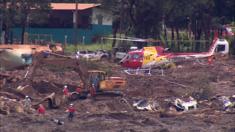
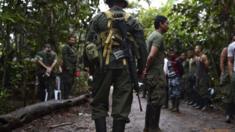
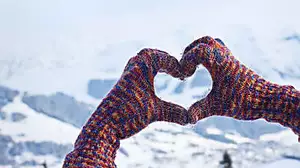
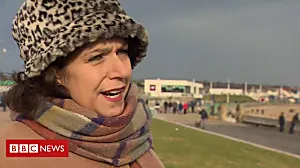
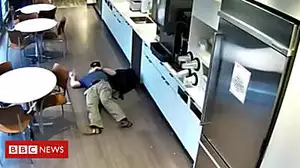
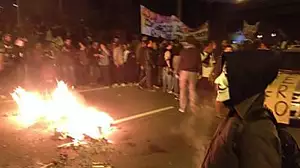
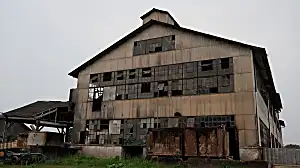
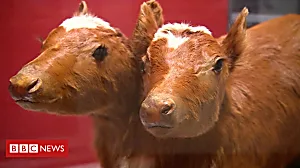
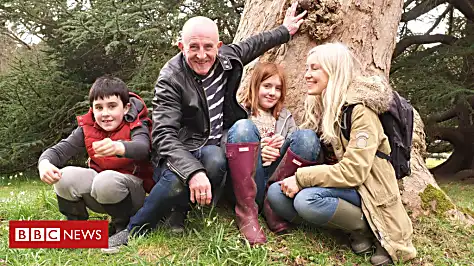
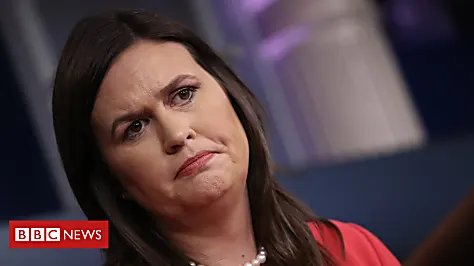
No comments:
Post a Comment